May 28, 2025 | 16:40 GMT +7
May 28, 2025 | 16:40 GMT +7
Hotline: 0913.378.918
May 28, 2025 | 16:40 GMT +7
Hotline: 0913.378.918
A conference on solutions to address challenges in agricultural exports was co-organized by the Ministry of Industry and Trade and the Ministry of Agriculture and Rural Development on the afternoon of May 28. At the conference, Nguyen Ngoc Nam, Chairman of the Vietnam Food Association, reported that Vietnam's agricultural exports saw positive developments within the first four months of 2024. Namely, a total of 3.4 million tons of rice were exported, generating more than 2 billion USD in revenue, which is an increase of 11% in quantity and an increase of 34% in value.
Vietnam's major target markets include the Philippines, China, Indonesia, among others. During the first five months of 2024, domestic rice prices exhibited an upward trend compared to the corresponding period in 2023, thereby improving profitability for farmers nationwide.
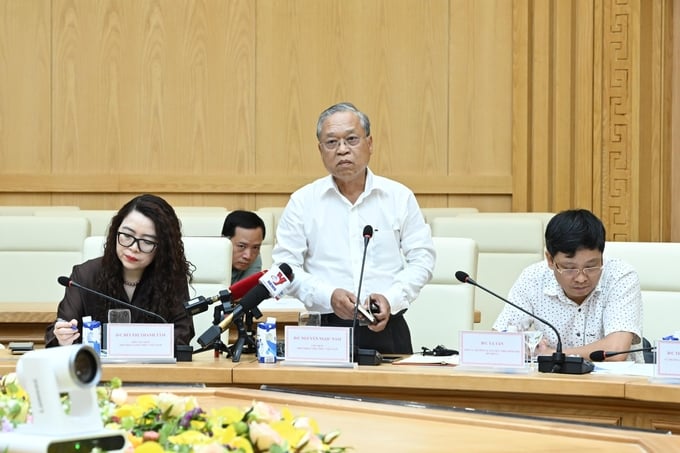
Nguyen Ngoc Nam, Chairman of the Vietnam Food Association, presenting at the conference. Photo: C.Dung.
Vietnam's rice exports in 2024 are projected to surge as major markets increase their import volumes. Countries around the world are closely monitoring India's response to El Nino by lifting its rice export restrictions. The possibility of these restrictions persisting until September presents an advantageous opportunity for Vietnam.
However, Chairman Nam highlighted several existing issues, including businesses owing money to farmers and engaging in unfair price competition. Consequently, he proposed relevant ministries and associations to take immediate and decisive action in response to these concerns.
Only 70 out of 157 active rice exporters are currently members of associations, resulting in challenges in the reporting and monitoring process. On the other hand, the existing regulation framework fails to provide an effective enforcement measure. As a result, only the Ministry of Industry and Trade possesses the capacity to address this issue. Furthermore, Chairman Nam suggested the implementation of a minimum export price for rice.
Nguyen Anh Son, General Director of the Agency of Foreign Trade under the Ministry of Industry and Trade, noted that the limitations in rice and fruit export activities are most prominent in the production and processing procedures.
According to General Director Son, the current production and processing practices of Vietnamese households and businesses fail to comply with quality regulations, and requirements pertaining to traceability and production unit code; small-scale and fragmented production, along with a lack of linkages, results in inconsistent product quality; deep processing for export products is limited; some businesses lack in-depth knowledge regarding the regulations and policies of import markets as well as the requirements associated with the benefits of Free Trade Agreements; some businesses fail to prioritize brand building and product promotion efforts.
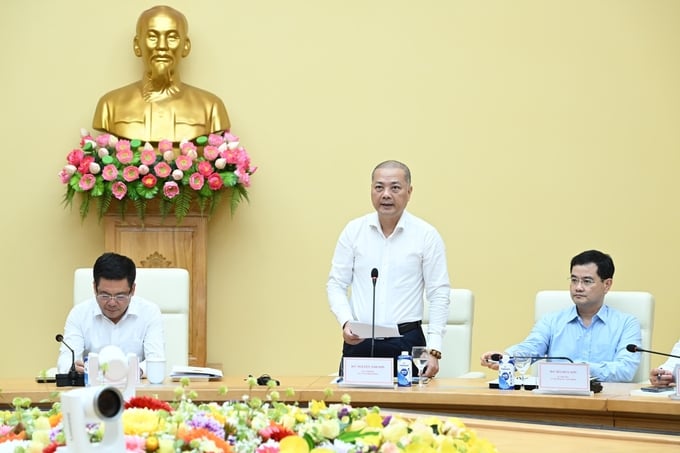
Nguyen Anh Son, General Director of the Agency of Foreign Trade under the Ministry of Industry and Trade, presenting at the conference. Photo: C.Dung.
Commercial activities involving rice and fruit products will continue to face numerous challenges in the foreseeable future, exacerbated by the ongoing global crises, including: escalating political instability around the world; persistently high inflation rates; and the continued implementation of strict monetary policies by major economies. These factors exert substantial pressure on the commodity market. Furthermore, there is a growing demand for high product standards and quality.
With the target of increasing exports by approximately 6% compared to 2023, the Agency of Foreign Trade emphasized the need to support businesses in production activities and resolving difficulties; enhance market information dissemination and trade promotion activities; utilize opportunities from trade agreements to negotiate market access, and address technical barriers and trade defense measures.
According to Nguyen Nhu Cuong, General Director of the Department of Crop Production under the Ministry of Agriculture and Rural Development, Vietnam's total rice production area is projected to reach approximately 7.09 million hectares in 2024, with an average yield of 61.2 quintals per hectare; marking an increase of approximately 0.2 quintals per hectare compared to 2023. The total rice production volume is projected to reach 43.4 million tons, marking a decrease of 35 thousand tons compared to 2023.
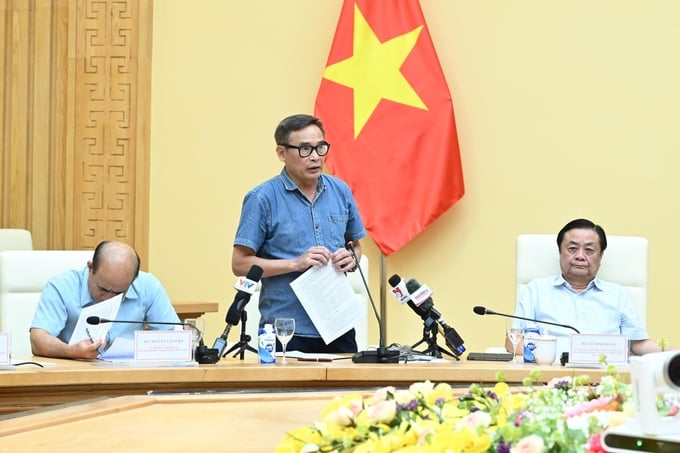
Nguyen Nhu Cuong, General Director of the Department of Crop Production, presenting at the conference. Photo: C.Dung.
On the other hand, the total vegetable production area is projected to reach approximately 1,030 thousand hectares in 2024, marking an increase of 30 thousand hectares compared to 2023. The vegetable yield is projected to reach 191.5 quintals per hectare, marking an increase of 0.5 quintals per hectare compared to 2023. The total vegetable production volume is projected to reach 19.7 million tons, marking an increase of approximately 624 thousand tons compared to 2023.
Without unusual weather patterns, natural disasters, or diseases until the end of the year, rice and vegetable production is expected to meet the planned targets for production area, yield, and volume; thereby meeting domestic consumption needs and maintaining a supply of approximately 7.6 million tons of rice for export.
With the rapid and unplanned increase in the area and production of fruits such as durian, the Ministry of Agriculture and Rural Development is actively issuing guidelines on production area requirements, varieties, and cultivation and harvesting processes; promoting the inspection and monitoring of production unit codes and export packaging facility codes as required by signed protocols; continuously improving the national standards and technical regulations system to standardize the harvesting, preliminary processing, and product processing procedures with the aim of meeting market requirements.
Nguyen Thanh Binh, Chairman of the Vietnam Fruit and Vegetables Association, stated that quality issues, particularly in fruits and vegetables, remain problematic, as evidenced by inconsistent product quality and the alarming presence of pesticide residues. Additionally, competitive trading activities, especially in raw material areas, are increasingly prevalent during market fluctuations. This longstanding issue, despite various solutions, has not been adequately addressed. The lack of strong linkages between producers and consumers during market fluctuations further exacerbates these challenges, with durian being the most affected product.
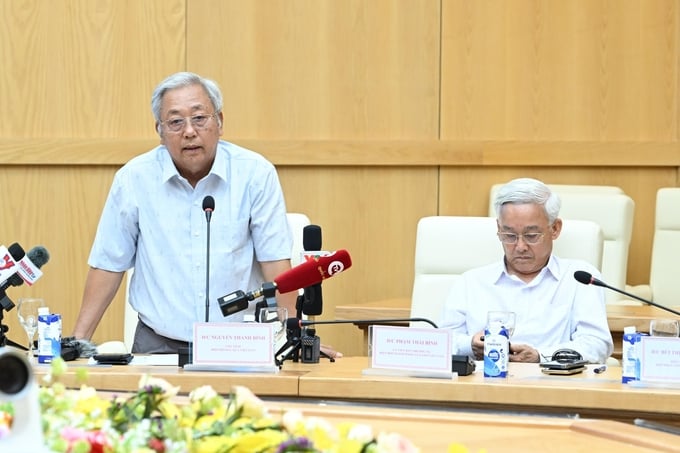
Nguyen Thanh Binh, Chairman of the Vietnam Fruit and Vegetables Association, presenting at the conference. Photo: C.Dung.
"Businesses within the association are facing considerable challenges as they all incurred losses in 2023. They are obligated to fulfill contracts they have signed; however, when they purchase from farmers and prices double, they are forced to accept market prices and bear the losses.
The management, inspection, and monitoring of quality-related violations in the production process - which encompasses the stages of input material acquisition, processing, preservation, implementing production unit and export packaging facility codes - have not been effectively carried out, resulting in ongoing violations. He emphasized that relevant authorities must collaborate with local governments and associations to improve inspection and monitoring efforts, with a focus on harvested products. Effective management of traders is essential to prevent competitive trading activities. The issuance of production unit codes has proven to be an effective measure, alongside promoting official export negotiations for avocados, fresh coconuts, and other products to enhance exports," General Director Binh remarked.
Firm measures to revoke rice and fruit export licenses for violations
According to Minister of Industry and Trade Nguyen Hong Dien, amidst a mix of favorable and challenging circumstances, to continue improving the effectiveness of sustainable rice and fruit export activities, while ensuring national food security, Minister Dien has proposed that industry associations focus on effectively disseminating information to producers, businesses, and members regarding the Party and State's current policies and mechanisms for production and export.
On the other hand, Minister Dien has suggested the Ministry of Agriculture and Rural Development to restructure the rice and fruit sectors towards increasing productivity and quality. The Ministry was also requested to focus on establishing suitable planning for production areas; coordinating production activities; improving seed structures; applying technology in production, harvesting, and preservation. Additionally, the Ministry needs to prioritize developing production, processing, and product quality standards in accordance with international economic integration requirements; thereby enhancing competitiveness, asserting traditional market positions, and expanding into potential markets.
Minister Dien also requested the Ministry of Home Affairs to guide industry associations in reviewing and establishing charters, operational regulations with a focus on strict compliance with legal regulations; and focus on building product and industry brands to enhance national reputation and brand development.
Regarding the Ministry of Industry and Trade, its agencies will continue to support businesses in promoting trade and brand building activities, and developing the agricultural market, prioritizing rice and fruit products. This initiative involves enhancing trade and brand promotion; utilizing geographical indications, national brands; increasing market share in traditional markets; exploring niche markets; and acquiring access to new and potential markets.
There is an emphasis on the inspection, monitoring, and handling of violations, with a firm stance on revoking export licenses for rice and fruit businesses if they breach current legal regulations.
Translated by Nguyen Hai Long
/2025/05/27/4731-2-223159_980.jpg)
(VAN) No votive paper, no styrofoam, no plastic bags, no plastic bottles, and no single-use plastic trays are the key rules tourists should keep in mind when visiting Con Dao.

(VAN) In the fight against plastic pollution, Vietnam has been demonstrating a proactive, pioneering, and active role in addressing the greatest environmental challenge today.
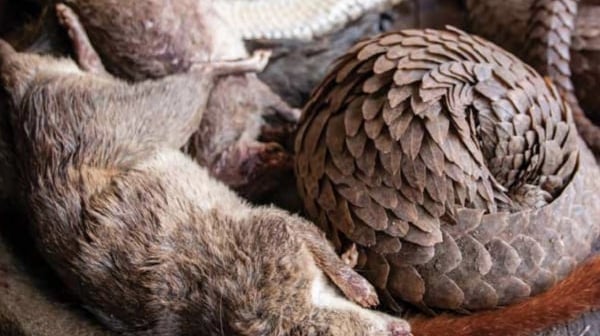
(VAN) The WOAH guidelines provide a vital tool for risk chain analysis, covering the extraction, transportation, consumption, and handling of confiscated wildlife.
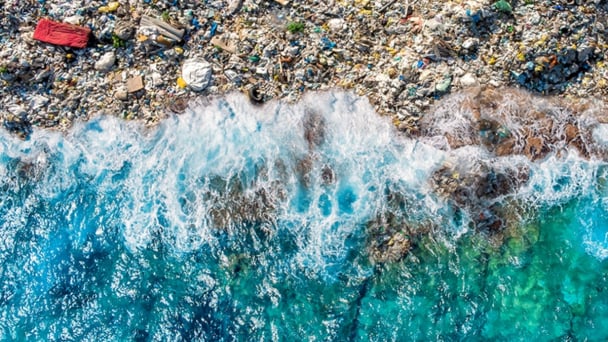
(VAN) World Environment Day 2025 is launched by the United Nations Environment Programme (UNEP) with the theme 'Beat Plastic Pollution'.
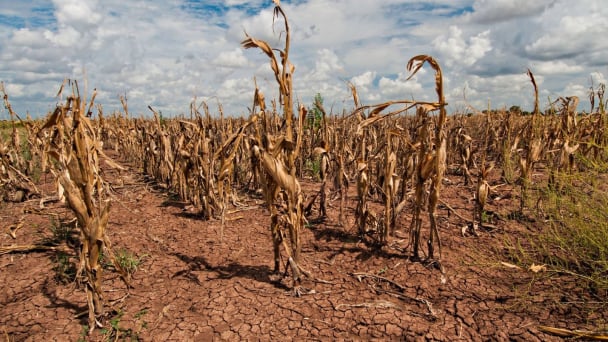
(VAN) As climate whiplash reshapes yields, experts say data-driven tools and targeted relief are critical to feed America.
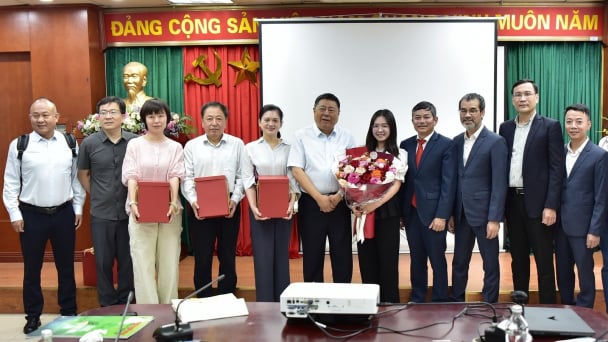
(VAN) The alignment in goals and operational direction between the Vietnam Agriculture and Nature Newspaper and Shaanxi Daily opens up promising prospects for journalism and media cooperation.
/2025/05/26/3422-3-102748_432.jpg)
(VAN) Prime Minister Pham Minh Chinh has been honored as the Distinguished ASEAN Leader at the ASEAN Leadership and Partnership Forum (ALPF) 2025 held in Malaysia, affirming Vietnam’s role and reputation.